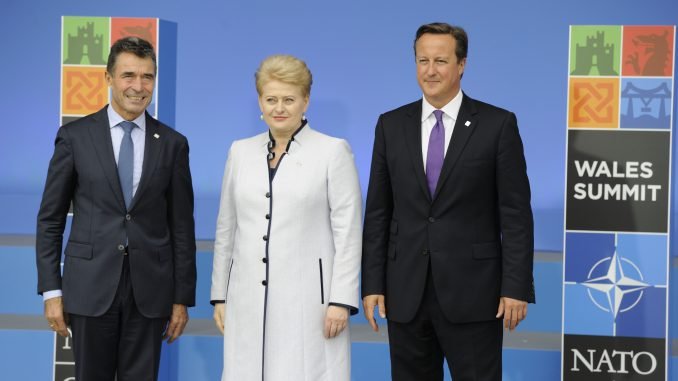
The only variable that remains, he says, is whether Lithuania will follow through with its own commitment to dedicate at least two percent of the GDP for defence by 2020.
On Friday, NATO leaders announced a decision to establish headquarters in the Baltics, with their functions and structure to be finalized this autumn.
“Headquarters will be set up in Lithuania and other Baltic states. They would help to receive backup and organize collective defence exercises,” President Dalia Grybauskaitė said in a press release.
There also came an announcement from the NATO summit in Wales about an agreement to create a new “spearhead” rapid reaction force of some four thousand troops ready to deploy at short notice.
“Essentially these are reinforcements of our defence and tangible instruments that will enable NATO to come to the assistance of the Baltic states, if need be. It’s a very welcome development,” Rakutis says.
“The important thing now is that Lithuania contributes with its own efforts to strengthening defence and that our defence funding move up from its current limbo. Up until now, we have had much talk and little action in boosting our defence. The plans for 2020 still look like a joke compared to Estonia’s. We need to pull up internally and overcome domestic oppositions.
“It would seem ridiculous if NATO beefed up its military capacity while Lithuania economized on defence. Our nation has this idea that everyone else must defend Lithuania except Lithuanians themselves. I cannot understand this kind of parochial thinking – that the masters must fight for us and peasants must work. We are now our own masters and must take responsibility for our defence. For a long time, we had been the country with worst defence funding,” professor Rakutis says.
The NATO headquarters in the Baltics and the new rapid reaction force are substitutes of permanent NATO bases that the Baltic states and Poland wanted to have set up in their territories. Some NATO states, including Germany, say that such bases would violate the 1997 agreement with Russia.
“We could have had those bases, it would have been an even more serious and assertive statement,” says professor Rakutis, “but since some EU countries seem to be advocating for Russia, the decision is a compromise, though a good one. I think Lithuania did not lose in this case.”
President Grybauskaitė: historic decision
Lithuania’s President Dalia Grybauskaitė has described decisions reached in Wales as historic, BNS reports.
“It is important, it is historic. This is something what Lithuania, all Baltic countries and Poland have been striving for, this was confirmed today,” Grybauskaitė told journalists in Wales on Friday.
“We have received commitment of all 28 countries to defend our region immediately, should any threat arise – and this would be done within hours, not within days,” said the Lithuanian president.
She also underlined that NATO openly listed Russia as “aggressor in Europe” and said that “there is no strategic partnership between NATO and Russia.”
“I could even make a bad joke – we should probably thank the aggressor for showing that NATO earlier was not adequately ready to defend the Baltic states and Poland, and now this has been done,” said Grybauskaitė.
Defense Minister Juozas Olekas said Lithuania would have to prepare an infrastructure to implement the NATO decisions.
“We will have to complete battalion development, appoint personnel and prepare infrastructure for the future NATO headquarters and storage of equipment. Without a doubt, we will continue providing the necessary support to NATO troops deployed in Lithuania,” the minister said.

Be the first to comment